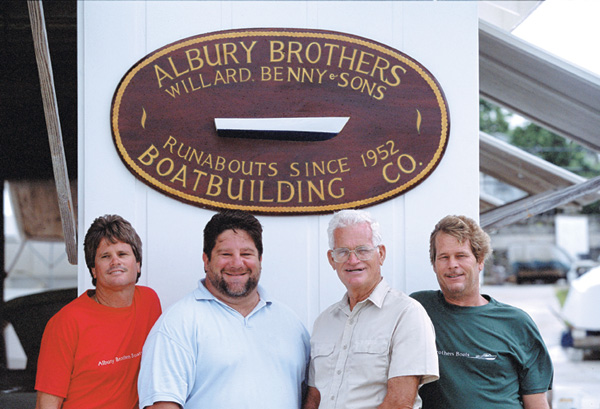
Jeff Lichterman (BSM '83), second from left, traveled to the Abaco Islands and spent a week working with Willard Albury and his sons in their shop to convince the legendary boat builder to let him manufacture Albury Brothers boats in the U.S.
Boating, you might say, is in Jeff Lichterman’s blood. He spent his summers growing up on the shore of Lake Hopatcong in New Jersey and cut his teeth on his father’s 17-foot runabout. Lichterman developed such a passion for boating that he eventually sent a letter to the president of Concord Yachts asking for the rights to open a local dealership.
He was 11 years old at the time.
Lichterman went on to a successful, albeit landlocked, business career. He owned and operated 15 Midas Muffler shops in the Fort Lauderdale area and later started a dot com catering to the automotive aftermarket industry, but the sea continued to call him. He bought a sailboat and began racing competitively. Later, he purchased a 68-foot yacht and dropped out for a year, cruising to South America with his wife and three children. At least once a year, he’d make the short trip from his home in Florida to the Bahamas, where he’d spend a few weeks sailing the pristine, sparsely populated Out Islands.
It was on one of those trips to the Bahamas that Lichterman first became acquainted with Albury Brothers Boats. The Alburys are descendents of British loyalists who settled in the Bahamas after fleeing America during the Revolutionary War. Forced to eke out a living from the sea, the loyalists became master boat builders, a trade members of the Albury family have practiced on Man O’ War Cay in the Abaco Islands for more than 200 years. Since the early 1950s, Willard Albury, first with his father and brother and now with his two sons, has carried on that family tradition, building sturdy, sea-friendly boats that are proudly out of step with the times.
“Their choice of material and the amount of materials would be considered overbuilt by today’s standards, but the result is you get a boat that’s stronger and lasts longer,” Lichterman says. “Today’s modern hull bottoms are straighter because it’s easier to design boats that way and there are high-speed efficiencies, but with the roundness of the old designs, you have a much better midrange ride and performance.”
As more and more Americans traveled to the islands, Albury’s line of outboard runabouts and skiffs became highly sought after by serious boaters, who prized their elegant lines and smooth ride, but demand for the boats far exceeded the Alburys’ output of one per month. Lichterman tried to purchase one but couldn’t even get on the list to be put on the list.
In 2003, Lichterman was searching for a new business venture, ideally one that would let him indulge his passion for boating, when he got a crazy idea. Since so many Americans wanted Albury boats, why not partner with the Alburys to build them in the U.S.?
“The idea popped into my head, but I never thought I could pull it off,” Lichterman says. “I called up Willard Albury, introduced myself and told him I’d like to run a concept by him.”
Armed with a draft contract, Lichterman flew to the Bahamas and spent a week with Willard Albury in his shop. He didn’t discuss business. Instead, he rolled fiberglass, swept the floor and did his best to convince the lengendary boat builder he was serious. At the end of the week, Lichterman went to Albury and asked if he wanted to do the deal.
“He said, ‘Yeah, I suppose so,’” Lichterman laughs. “That was it.”
Lichterman returned to Abaco a few weeks later, this time spending a month with the Alburys, meticulously writing down every step involved in building one of their boats. He shipped the partially completed boat back to the U.S. to reverse engineer its construction and make the molds.
“I never had any worries that we would sell these boats because the brand was so strong,” Lichterman says. “What I was concerned about was that I’d screw up the first boat and we’d get a bad reputation.”
Lichterman needn’t have worried. Business was a little slow at first, but as soon as customers realized the U.S.-built boats were identical in quality to those made in Abaco, sales took off. Today, Lichterman produces about three boats per month at his facility in Riviera Beach, Fla., with prices ranging from $45,000 for a basic 20-footer to $150,000 for a fully outfitted 27-footer.
And while he doesn’t get much resin on his hands anymore, Lichterman still visits the shop every day and helps out when he can.
“I like to keep my hands on,” Lichterman says. “That’s what I didn’t like about my previous businesses. As we grew and got a couple of layers of management, I felt really disconnected. You only get the problems at the top and it gets to be a negative environment, so being hands on is a wonderful thing.”

